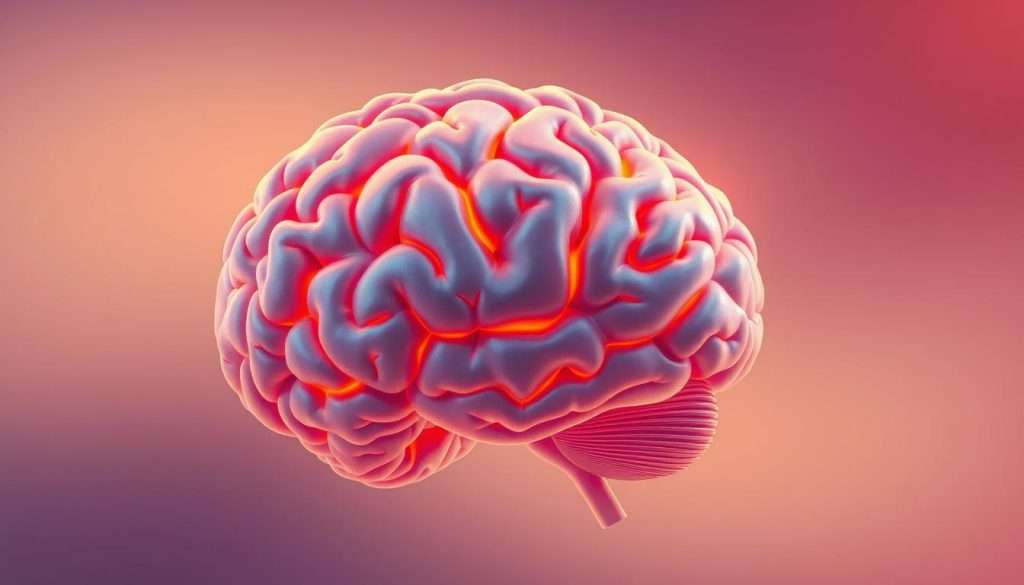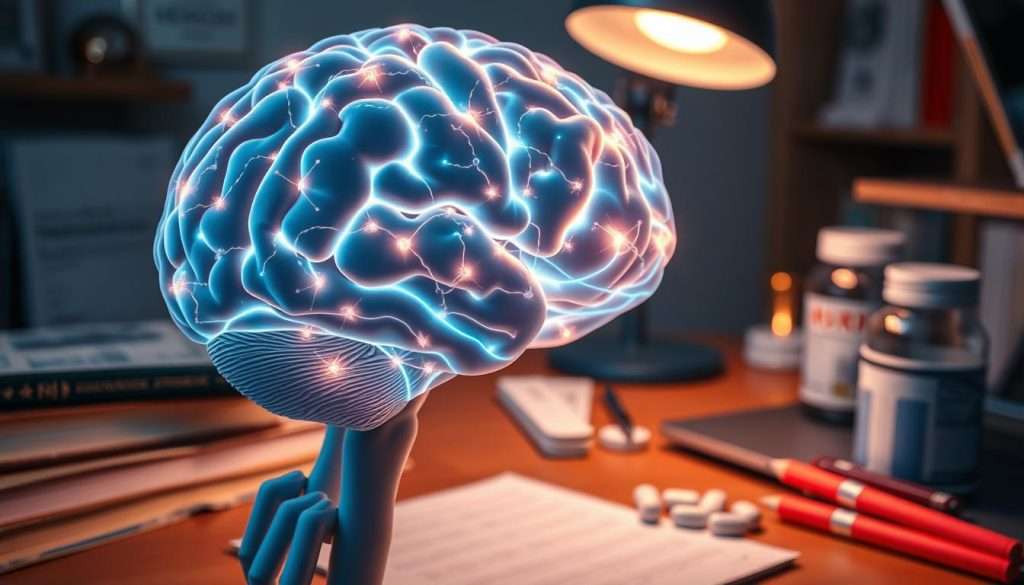Are you looking to enhance your memory and improve your brain power? You’re not alone. Many people want to boost their memory to do better in work and life.
Recent studies show that improving memory is possible with practice and healthy habits. Experts recommend using mnemonic devices, flashcards, and the method of loci to enhance memory.
By adding these strategies to your daily life, you can start on the path to a sharper mind and better memory.
Key Takeaways
- Practice techniques like mnemonic devices and flashcards to improve memory.
- Adopt healthy habits to support cognitive function.
- Use the method of loci to enhance memory.
- Make memory improvement a part of your daily routine.
- Start seeing improvements in your cognitive abilities.
The Science Behind Memory Formation
To boost your memory, it’s key to know how your brain works. It encodes, stores, and retrieves information. This process involves many stages and neural paths.
How Your Brain Creates and Stores Memories
Creating memories is complex. The neuroscience behind memory encoding is crucial. Encoding is the first step where info is prepared for storage.
The Three Critical Stages of Memory Processing
Memory processing has three main stages: encoding, storage, and retrieval.
Encoding: Getting Information In
Encoding is the first step. It’s where info is first processed.
Storage: Keeping Information Available
Storage is about keeping info safe over time.
Retrieval: Accessing Stored Information
Retrieval is the last step. It’s when we use the info we’ve stored.
Knowing these stages helps improve memory. For example, repetition and association can help with encoding and retrieval.
| Stage | Description | Techniques for Improvement |
|---|---|---|
| Encoding | Initial processing of information | Repetition, Association |
| Storage | Retention of information over time | Spaced Repetition, Chunking |
| Retrieval | Accessing stored information | Mnemonics, Mind Palace |
“The mind is not a vessel to be filled, but a fire to be kindled.”
By grasping the science of memory and using techniques to boost each stage, you can enhance your brain’s abilities. This will help improve your memory significantly.
What Makes a Super Memory Different
People with amazing memory skills have unique traits. These traits help them remember and process information better. They also boost their brain power.
Characteristics of People with Exceptional Memory
Those with incredible memory skills share some key traits. Two stand out:
Attention to Detail and Pattern Recognition
Exceptional memory folks focus well on details and patterns. This skill helps them keep and organize info better.
Enhanced Neural Connections
Studies show super memory people have stronger neural connections. These connections make info processing quicker and smoother.
Can Anyone Develop a Super Memory?
The debate is whether super memory is born or made. The truth is a mix of both.
The Role of Practice vs. Natural Ability
Some naturally have better memory, but practice can really boost it. Using mnemonics, memory palaces, and spaced repetition helps a lot.
Success Stories of Ordinary People with Trained Memories
Many have improved their memory through hard work and practice. Their stories show that anyone can get better with effort.
Building Your Memory Foundation
To build a strong memory foundation, focus on both physical and mental health. A healthy lifestyle is key for optimal brain function. This is crucial for memory formation and recall.
Optimizing Your Physical Brain Health
Physical brain health is the base for a strong memory. This includes nutrition for cognitive enhancement and sleep hygiene for memory consolidation.
Nutrition for Cognitive Enhancement
Eating foods rich in omega-3 fatty acids, antioxidants, and vitamins is good for your brain. Salmon, blueberries, and leafy greens are great for your brain health.
Sleep Hygiene for Memory Consolidation
Getting enough sleep is key for memory. Good sleep hygiene, like a regular sleep schedule and a calm sleep space, boosts memory.
Mental Preparation Techniques
Mental preparation is also vital for a strong memory foundation. Techniques like mindfulness and focused attention help improve concentration and flexibility.
Mindfulness and Focused Attention
Mindfulness, including meditation and deep breathing, can help you stay focused and reduce distractions.
Stress Management for Better Recall
Managing stress well, through exercise and relaxation, helps protect your memory from stress’s negative effects.
| Technique | Benefit |
|---|---|
| Nutrition for Cognitive Enhancement | Supports brain health |
| Sleep Hygiene | Improves memory consolidation |
| Mindfulness | Enhances focus and concentration |
| Stress Management | Reduces impact of stress on memory |
The Mind Palace Method: Spatial Memory Mastery
Learn how the Mind Palace Method can change your memory. It uses your brain’s spatial skills. This old method, also known as the method of loci, helps memory champions remember a lot.
Step-by-Step Guide to Creating Your First Memory Palace
First, pick a place you know well. It could be your childhood home, a favorite park, or a route you often take.
Selecting Familiar Locations
Pick a place you know well. The more you know it, the easier it is to use it for your memory palace.
Mapping Out Your Mental Journey
After picking your place, plan a path through it. Find special spots or landmarks to store your memories.
Populating Your Palace with Memorable Images
The secret to a great memory palace is making vivid, memorable pictures. These pictures should remind you of the information you want to remember.
Creating Bizarre and Memorable Associations
The weirder and more memorable your pictures, the better they’ll stick in your mind. Let your imagination run wild to make unique and striking images.
Practice Exercises for Beginners
Begin with simple lists or sequences. As you get better, you can tackle more complex information.
Advanced Memory Palace Techniques
Once you’ve got the basics down, you can improve by using more than one palace. Keep them up to date regularly.
Using Multiple Palaces for Different Subjects
Having multiple palaces helps you organize and store different kinds of information. This is great for students or professionals with many subjects to remember.
Maintaining and Refreshing Your Memory Palaces
Visit and update your palaces often to keep the information fresh. This keeps your memory sharp and your recall quick.
Mastering the Mind Palace Method boosts your memory. It makes remembering complex stuff easier and helps you reach your goals.
Powerful Mnemonic Systems for Everyday Use
To boost your memory, try different mnemonic systems in your daily life. Mnemonic devices are great for improving memory. You can use acronyms, acrostics, and the major system to remember various information types.
Word-Based Mnemonics
Word-based mnemonics help remember lists, phrases, or sequences. Two key methods are creating acronyms and acrostics.
Creating Effective Acronyms and Acrostics
Acronyms start with each word’s first letter to form a new word. For example, “ROY G BIV” stands for the rainbow colors. Acrostics make a sentence or phrase where each word’s first letter matches the information you want to remember.
The Link Method for Connected Information
The link method links each item to the next. It’s great for remembering sequences or lists.
Number Mnemonics
Number mnemonics help with remembering numbers. The Major System and the Dominic System are two effective methods.
The Major System for Digits
The Major System turns numbers into words using consonant sounds. This makes numbers easier to remember.
The Dominic System for Dates and Numbers
The Dominic System links numbers to people, actions, or events. It’s perfect for remembering dates and numbers.
Visual and Sensory Mnemonics
Visual and sensory mnemonics use colors, emotions, and senses to improve memory. Techniques include using color, emotion, and multi-sensory encoding.
Using Color and Emotion in Memory Techniques
Linking information with vivid colors and emotions makes it stickier. Bright colors and strong emotions boost recall.
Multi-Sensory Encoding Strategies
Using multiple senses (sight, sound, touch, taste, smell) enhances memory. For example, linking a word with a visual, sound, and action makes it memorable.
By using these mnemonic systems daily, you can see a big memory boost and better cognitive enhancement. Regular practice will have a lasting effect on your memory.
Mastering the Art of Super Memory
Memory athletes use many strategies to get better at remembering things. These methods help them in competitions and everyday learning. They make our brains work better.
Memory Athletes’ Secret Techniques
Memory athletes focus on quick learning and intense training. These are key to their success.
Speed Memorization Methods
Speed memorization lets you learn and remember fast. The method of loci is a great example. It uses a familiar place to remember things.
Competition-Level Memory Training
For top memory skills, athletes train hard and use special tricks. The Major System is one such trick for numbers.
Applying Super Memory Techniques to Learning
These memory tricks work for learning many things. They help with books and new languages.
Memorizing Textbooks and Course Material
Techniques like chunking and the memory palace help with books. Breaking down info and linking it to images boosts memory.
Language Acquisition Through Memory Systems
Memory tricks also help with learning languages. Mnemonics can make remembering words and rules easier.

Using these methods daily can make your memory better. With regular practice, you can get a super memory for all areas of life.
Chunking: Breaking Down Complex Information
Chunking is a method to break down complex info into smaller bits. This makes it easier to remember. It helps you process and keep information better.
The Psychology Behind Chunking
Chunking works with how our memory handles info. It helps us deal with the limits of our brain’s capacity.
Working Memory Limitations
Our working memory can hold about 7 ± 2 chunks at a time. This can make complex data hard to process. Chunking groups info into larger, easier-to-remember units.
How Chunking Expands Memory Capacity
Chunking lets us handle more info by organizing it. Each chunk is stored in our working memory, not individual pieces.
Practical Chunking Methods
Chunking can be used in many ways. For numbers, group digits to remember them better. For text, break it into categories or use acronyms.
Chunking Numbers and Dates
Phone numbers are often broken into parts to aid memory. Historical dates can be grouped by period or tied to key events.
Chunking Text and Concepts
Complex texts or ideas can be organized with outlines or mind maps. This breaks them down into easier-to-handle chunks.
Exercises to Improve Your Chunking Skills
Try progressive chunking exercises to get better. Start with simple tasks like memorizing phone numbers or lists. Then, move to more complex info.
Progressive Chunking Challenges
- Memorize a list of 10 items by grouping them into categories.
- Chunk a complex text into main ideas and supporting details.
Real-World Applications
Using chunking daily can greatly improve your memory and brain skills. This leads to better performance in all areas of life.
Spaced Repetition: The Science of Not Forgetting
Spaced repetition is a powerful technique that helps you remember things better. It uses the science of memory to improve your recall. By understanding how our brains work, you can boost your memory.
Understanding the Forgetting Curve
The forgetting curve shows how our memory fades over time if not refreshed. It was first explored by Hermann Ebbinghaus.
Ebbinghaus’s Research on Memory
Ebbinghaus studied memory deeply. He found that forgetting happens fast unless we review what we learned. His research shows how spaced repetition can fight forgetting.
Optimal Timing for Review Sessions
Timing is everything in spaced repetition. We should review material just before it’s about to be forgotten. This timing helps solidify our memory and prevents forgetting.
Implementing Spaced Repetition in Your Life
To use spaced repetition, you need a personal review plan. First, list what you want to remember. Then, plan your first review soon after learning it. Next, space out your reviews further apart.
Creating a Personalized Review Schedule
Begin by making a list of what you want to remember. Schedule your first review soon after learning it. Then, plan reviews for longer intervals, like one day, three days, a week, and so on.
Digital Tools and Apps for Automated Spaced Repetition
Many digital tools and apps help with spaced repetition. They automate the review process, making it easier to follow your schedule. Apps like Anki and Memrise are popular choices.
Using spaced repetition can greatly improve your memory. It helps you remember information better when you need it.
Daily Habits That Strengthen Your Memory
Improving your memory is easy with daily habits. Simple routines can boost your brain health. This way, you can enhance your thinking and memory.
Physical Practices for Brain Health
Exercise is key for a healthy brain. It makes blood flow better, helping your brain work and remember better.
Exercise Routines That Boost Cognitive Function
Aerobic exercises like running or swimming are great. They help your brain stay flexible and adaptable.
Brain-Boosting Nutrition and Supplements
Eating right is important for your brain. Foods like salmon and blueberries are good. You might also want to try omega-3 and vitamin D supplements, but talk to a doctor first.

Mental Exercises for Daily Memory Enhancement
Mental exercises are crucial for better memory. Doing brain challenges can help your brain stay sharp.
Morning Memory Routines
Start your day with brain games. Simple memory games or mnemonic devices can wake up your brain.
Evening Review Practices
Review your day before bed. Think about what happened and try to remember details. It helps keep your memory strong.
Overcoming Common Memory Challenges
As you work on improving your memory, you’ll face common challenges. These can be solved with the right strategies. Understanding these challenges is key to better memory.
Remembering Names and Faces
Remembering names and faces is a big social challenge. The Name-Face Association Technique is very helpful.
The Name-Face Association Technique
This method links a person’s name to their face with a mental image. For example, think of a rose for someone named “Rose.” This makes their face stick in your memory.
Practice Exercises for Social Situations
Practice remembering names and faces by introducing yourself. Try to link their name to their face. Repeating their name in conversation helps too.
Managing Information Overload
Today, we face a lot of information. Prioritization Strategies help focus on what’s important.
Prioritization Strategies
Identify key information and filter out the rest. Use to-do lists or digital organizers to stay organized.
Note-Taking Systems That Support Memory
A good note-taking system helps remember things. Try the Cornell Notes system or digital apps for better organization.
Addressing Age-Related Memory Concerns
Memory can get worse with age. But, Neuroplasticity and Lifelong Learning help keep your brain sharp.
Neuroplasticity and Lifelong Learning
Keep your brain flexible by learning new things. This can be through new skills, reading, or brain training.
Preventative Practices for Cognitive Health
Regular exercise, a healthy diet, and managing stress also help your brain. These habits are good for your overall brain health.
Practical Applications of Your Super Memory
A super memory is not just a gift; it’s a tool for many benefits. It can improve your life in many ways.
Professional Advantages
Having a super memory can give you an edge at work. You can use it to:
Delivering Presentations Without Notes
Memorize key points and speeches for more confident presentations. This skill helps you connect with your audience and share your message well.
Remembering Client Details and Business Information
Recall client names, preferences, and business details. This helps you build stronger professional relationships and make better decisions.
Academic Excellence
A super memory is also great for school. You can use memory techniques to:
Exam Preparation Strategies
Memorize study materials to do better in exams. This can lead to higher grades.
Research and Writing Enhancement
Improved memory helps you remember research findings. It also helps organize your thoughts for better writing.
Personal Growth and Lifestyle Benefits
Developing a super memory can also improve your daily life. You can:
Learning New Skills More Efficiently
With a better memory, learning new skills and hobbies is easier. You can absorb and retain information more effectively.
Enhancing Daily Experiences Through Better Recall
Remember important dates, events, and conversations. This makes your personal and social life richer.
By using your super memory, you can open new doors and enhance your life quality.
Conclusion: Your Ongoing Journey to Memory Mastery
Getting better at memory takes time and effort. You need to keep practicing and using different memory tricks. Adding brain training to your daily life can really help you remember things better.
To have a super memory, you must know how your brain works. Methods like the mind palace, mnemonic systems, and spaced repetition can make your brain better at remembering.
Keep going on your memory journey by being persistent and practicing often. Try new memory tricks and exercises to keep your brain sharp. This will make your memory stronger and help you in work and personal life.
With hard work and the right brain training, you can get a super memory. This will help you in many areas of your life.

